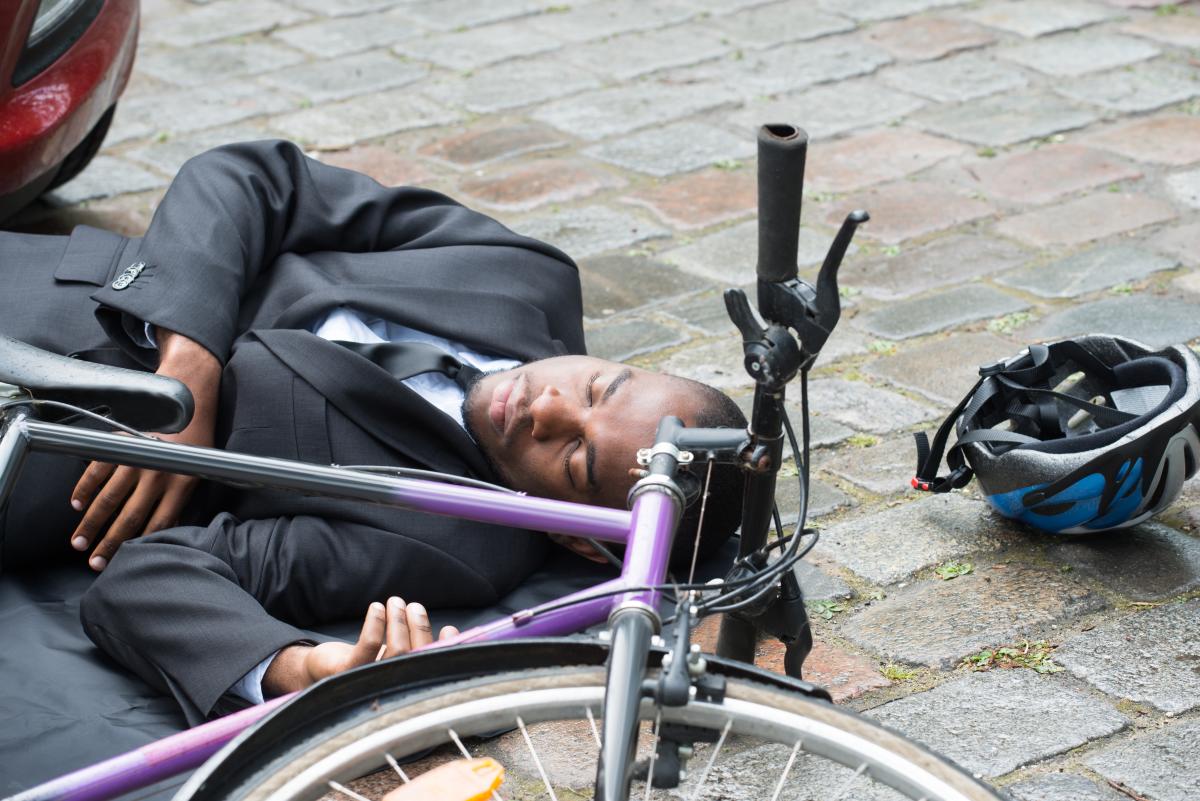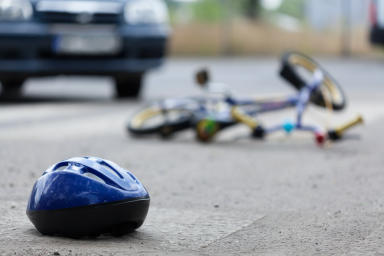What To Do After a Bicycle Accident: A Step-by-Step Guide

In the last decade, there has been a rise in the popularity of cycling in the United States. It is estimated that there are currently around 52 million bicycle riders in the U.S. and that bicycle sales rose 40% between 2019 and 2020. Many health enthusiasts and avid environmentalists have turned to cycling as an alternative to riding in motor vehicles for daily commutes. Recreationally, in addition to road biking, there has also been significant growth in mountain biking here in the U.S., with an average of 40 million Americans participating in mountain biking activities each year.
While cycling can be a healthy and fun activity, there is always some risk involved when getting on a bike. Whether you are a dedicated cyclist or a recreational rider, it is important to know the best steps to take in the event of a bicycle accident.
What To Do at the Scene of a Bicycle Accident
According to the CDC, almost 1,000 bicyclists die, and more than 130,000 are injured in crashes on the road every year in the United States. Cyclists can reduce the risk of harm or death by always wearing properly fitted bike helmets when riding, but they cannot mitigate the risk of an accident down to zero. Here’s what to do after a bicycle accident.
Remain at the Scene and Await the Police
Anytime there is an accident where injuries or property damage have occurred, call the police and remain at the scene until they arrive to assess the situation and file a report. Often when someone has been in an accident, they are unaware of the extent of their injuries until after the fact. It is important to have a legal record of the accident if future compensation or litigation is required.
Gather Contact Information for the Other Party
Whether you were hit by a motorist or in an accident with another cyclist, be sure to gather all of their pertinent contact information. Record their name, address, email address, and phone number. If you were hit by a car, make sure you also get the driver’s license number, license plate number, make and model of the vehicle, and any insurance information they have. Share your contact information with them as well.
Gather Contact Information for any Witnesses
If witnesses or bystanders were at the accident scene, try to gather their names, phone numbers, or email addresses. You may require their testimonies at a later date. If possible, ask them to hang around until the police arrive so that their accounts of the accident can be added to the police report.
Do Not Negotiate With the Other Party
If the other party involved was responsible for the accident, they might suggest that you avoid calling the police and try to reach a negotiation regarding compensation. This is ill-advised. Even if they accept accountability for their part in the accident, they may change their story after the fact. As you may not yet be fully aware of the extent of your injuries or damages to your bicycle, it is wise to involve the police and avoid private negotiations. If you think you were responsible for the accident, negotiating while discovering all the facts about the accident and its consequences is still not a good idea.
Keep Thorough Records About the Accident
Before leaving the scene of the accident, make sure you gather and record as much information about the accident as possible for your records. Where did the accident take place? What time of day was it? How did the accident happen, per your recollection? Were there other conditions that might have contributed to the accident, such as bad roads, traffic, or weather? Was the other party involved intoxicated? (Approximately a third of fatal bicycle accidents involve alcohol for either the motorist or the cyclist.)If you are able, take pictures of the scene, property damage, and all visible injuries.
Make Sure Your Statement is Recorded
When the police arrive, make sure they get your personal statement and include it in their report. They should get statements from all involved parties. Inform the police of any injuries you have incurred, no matter how minor they may seem, and ask them to include them in the report. Give them any contact info you’ve retrieved from witnesses. Once the report has been completed, get the name of the police officer who filed the report, and write down the report number for your records.
What To Do After Leaving the Scene of a Bicycle Accident
After you’ve filed a police report and left the scene of the accident, there are several more actions you’ll want to take to ensure that you are compensated appropriately for any injuries or property damage caused by your bicycle accident.
See a Medical Professional About Your Injuries
Whether your injuries seem minor or major, seeking medical attention after a bicycle accident is a good idea. A written evaluation of your injuries will be important for your records, and a doctor can also attest to how serious or inconsequential your injuries may be. Save all medical receipts and documentation.
Document Your Injuries
If you haven’t already, take photos of your injuries. Even if you don’t have any injuries you are aware of, monitor your post-accident symptoms for several days. Keep a written account. If your accident was serious enough that you were taken straight to the hospital, you might still need to speak with a police officer to get your official version of events into the police report.
Retain Your Evidence
Any clothing or personal items damaged in the accident should be kept safe and preserved as they were found after the accident. If you were able to collect your bike and its damaged parts from the scene of the event, hang on to these things as evidence, and do not repair them. If you must repair them, get photographic and written documentation of the damages first. Save all receipts and documentation related to repairs.
Do not Negotiate Directly With Any Insurance Company
If the responsible party’s insurance company contacts you directly and attempts to reach a negotiation before an accident claim has been filed, do not take them up on their offer. Before speaking with anyone (even your insurance company) about settlements or compensation, contact a qualified personal injury attorney for appropriate legal advice.
How to Start a Bicycle Accident Lawsuit
If you were in a bicycle accident with a motor vehicle, you might be entitled to compensation. Working with a personal injury attorney to file a claim will be your best course of action toward recovering damages. Below are some general guidelines to follow when moving forward with a bicycle accident claim.
Draft Your Demand Letter
Work with your attorney to draft a letter detailing the accident and all resulting injuries and damages. Keep in mind that not all damages are tangible or easily quantifiable. As a result of the accident, things like pain and suffering or changes in your ability to do everyday tasks may be considered. Outline your demands in terms of compensation. This letter will be included when you file a claim with the responsible party’s insurance company.
Take Your Time
Do not rush to make your demands. While you may be eager to be compensated for your injuries as soon as possible, it is a good idea to wait until you have fully healed, or at least until you know the full extent of your injuries and damages, before filing a claim. Be thorough and accurate when documenting your daily life after the accident. Do not miss any related doctor appointments, and be sure to follow doctor’s orders. See that your attorney has all medical documentation about the accident. This will help ensure that you receive the fairest settlement in the end.
Avoid Sharing On Social Media
As a general rule of thumb, it is a good idea to avoid posting about your accident and ensuing claims on social media before a settlement has been reached. It is entirely possible that an insurance company could find something in your social media updates to counter your claims for damages owed.
Negotiations
Once your official claim has been filed with the appropriate insurance company, you will wait for them to investigate the claims and to see if they accept your demands. If they accept, you may expect to wait up to around six weeks to receive your payment, though this timeline varies from case to case. Rather than accept, they may present a counteroffer.
Arbitration and Litigation
If you are unable to negotiate an appropriate settlement directly with the insurance company, you may move on to arbitration. Arbitration is a process where both parties involved in a dispute consent to having their cases presented to a qualified arbitrator out of court. Decisions reached through arbitration are binding. You could elect to file a lawsuit as an alternative to the claims process. In so doing, you would list the at-fault party as the defendant, as well as any other potentially responsible entities. Filing a lawsuit is the longest and most arduous process of the options available. Always ask your attorney for advice in these matters.
Resources for Victims of Bicycle Accidents
If you’ve been in a bicycle accident, you may need more than just legal assistance. There are many free and easily accessible resources available online and in communities around the United States that you may find helpful.
Disability and Temporary Disability Benefits
Depending on a number of factors, such as the nature and severity of your injuries, your age, your financial status, and whether or not you are able to work after the accident, you may be eligible for government-funded disability benefits that can help with finances while you await your settlement.
If you meet the following requirements, you may qualify for SSDI benefits:
You are unable to work due to a medical condition that is expected to last at least a year or result in death.
Your disability is not partial or short-term.
You meet the Social Security Administration’s definition of disability.
You are younger than your full retirement age.
For SSI benefits, the following requirements must be met:
● For Adults:
○ Are age 65 and older, blind, or have a disability.
○ Have limited income (wages, pensions, etc.).
○ Have limited resources (the things you own).
○ Are U.S. citizens, nationals of the U.S., and some noncitizens.
○ Reside in one of the 50 states, the District of Columbia or the Northern Mariana Islands. It does not include Puerto Rico, Guam, or the United States Virgin Islands. Exception: The children of military parent(s) assigned to permanent duty outside the U.S. and certain students temporarily abroad may receive SSI payments outside the U.S.
● For Children:
○ Are under age 18 and have physical or mental condition(s) that very seriously limits their daily activities for a period of 12 months or more or may be expected to result in death, and
○ Live in a household with limited income (benefits based on need) or resources.
To determine which benefits you may qualify for, you can reach the program at 1-800-772-1213 or go to https://ssabest.benefits.gov/benefit-finder/.
Legal Aid
The American Bar Association Free Legal Answers is a virtual legal advice clinic that provides an online version of the walk-in clinic model. Users may request brief advice and counsel from a volunteer lawyer about a specific civil legal issue by posting their civil legal questions to their state’s website. Lawyers will then follow up with basic legal advice and information, with no expectation of long-term representation. This is an excellent resource for people seeking advice and information about non-criminal legal matters but cannot afford a lawyer.
You can contact the ABA through the ABA Service Center Hotline at (800) 285-2221 or email them at Service@americanbar.org, Monday - Friday, 9:00 AM - 6:00 PM ET.
Expertise.com StaffAuthor
Step into the world of Expertise.com, your go-to hub for credible insights. We don't take accuracy lightly around here. Our squad of expert reviewers, each a maestro in their field, has given the green light to every single article you'll find. From rigorous fact-checking to meticulous evaluations of service providers, we've got it all covered. So feel free to dive in and explore. The information you'll uncover has been stamped with the seal of approval by our top-notch experts.




